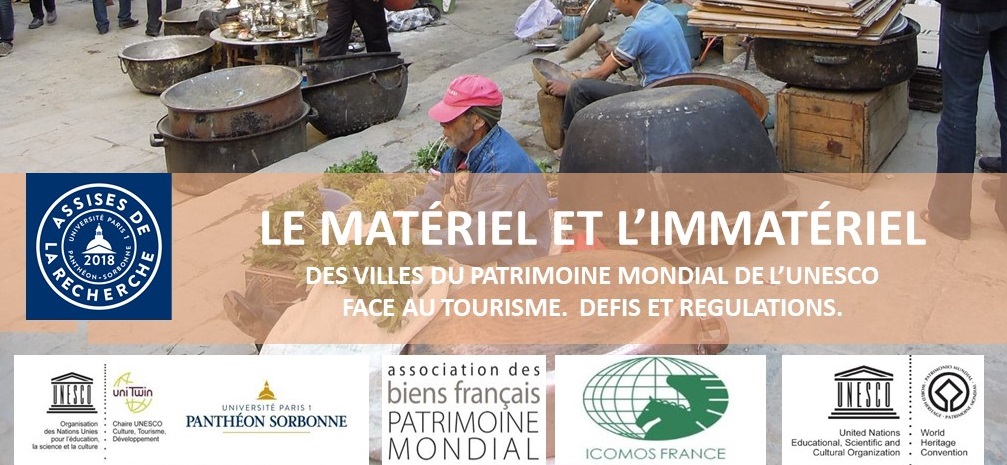
|
|
|
programme (english)9h00:Welcome 9h15:Opening Georges Haddad, President of Paris 1 Pantheon-Sorbonne University Chloé CAMPO, Association desBiens Français du Patrimoine Mondial Jean-François Lagneau, Chief Architect of Historical Monuments, Honorary Inspectorof the Historical Monument, ICOMOS France Peter DEBRINE, Senior Project Officer, World Heritage Nature, Sustainable Tourism and Outreach Unit
10h00: Introduction
Maria Gravari-Barbas, Head of the UNESCO Chair « Culture, Tourism, Development », IREST, EIREST, Paris 1 Pantheon-Sorbonne University Sébastien Jacquot, UNESCO Chair « Culture, Tourism, Development », IREST, EIREST, Paris 1 Pantheon-Sorbonne University Aurélie CONDEVAUX, UNESCO Chair « Culture, Tourism, Development », IREST, EIREST, Paris 1 Pantheon-Sorbonne University
10 :30 -12 :00 : 1stRound Table. Local Inhabitants and Diversity of Functions in World Heritage Cities How doovertouristified World Heritage Cities regulate tourism? How do they alleviate tourism impacts? What are the regulation tools and mechanisms?
Moderator:Marielle Richon, Former Programme Specialist at the UNESCO World Heritage Centre, Member of ICOMOS France Xavier BAILLY, Administrator of Mont-Saint-Michel Abbey: Living on a tourist site. Management challenges Carolina Taddei, Councillor, Municipality of San Gimignano: San Gimignano. A small city versus a major tourism attraction Katarzyna Janusz, Post-Doctoral Researcher KU-Leuven University: Kraków: Between tourismification and search for the lost genius loci
Laurent Bourdeau et Pascale Marcotte, Partnered research chair on tourism attractiveness and innovation, Université Laval: Adaptation to overcrowding in tourism. Between regulations and taboos. Reflections from the Historic District of Old Quebec Laurent Hodebar, Mission Tourisme, Bordeaux:Management systems for tourist attendance in Bordeaux 12:00 – 12:30:discussion 12:30 – 14:00:Lunch break
14:00 -15:30: 2ndRound Table Protection of the Intangible character of World Heritage CITIES:Approaches and Tools
The intangible heritage character of World Heritage cities is based on a set of factors that relate to everyday life and relationships, and mix of functions, events and urban expressions. If cities have the tools and means to preserve tangible heritage, it is not always the same for the intangible nature of this heritage. How do World Heritage cities preserve the intangible nature of their heritage?
Moderator:Anne Vourch’, Advisor to the Réseau des Grands Sites de France Yoel Mansfeld, University of Haifa: Developing bottom-up intangible heritage as a reaction to top-down WHS inscription: The case of Akko, Israel Jordi TRESSERAS, LAPBATC - Lab of Heritage and Cultural Tourism at Universitat de Barcelona: EU Guidelines for Immaterial Cultural Heritage and Sustainable Tourism. Best practices in World Heritage Cities inSpain: Patios Festival at Cordova (Andalucía), and the Humans Castles at Tarragona city (Catalonia) María García-Hernández, Université ComplutenseMadrid:Preserve the intangible aspects of the urban heritage of the 3 cities of the Madrid ring inscribed on the UNESCO World Heritage List (San Lorenzo de El Escorial, Aranjuez and Alcalá de Henares). Strategies, tools and challenges. Silvia Aulet, Dolors Vidal, University of Girona: Tourism Strategic Planning, a tool for heritage management. The case of Girona, Spain Julie Reynes, Mission Nice Patrimoine Mondial:Nice, a city born from tourism facing new challenges
15h30-16h00:Discussion
16:00 – 16:30: Conclusion and Perspectives
Maria Gravari-Barbas, Head of the UNESCO Chair « Culture, Tourism, Development », IREST, EIREST, Paris 1 Pantheon-Sorbonne University
Information and Registrations : Chaire-UNESCO-Tourisme@univ-paris1.fr |

